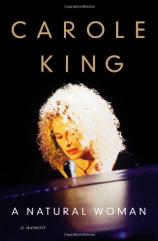A Natural Woman: A Memoir
Review
A Natural Woman: A Memoir
I couldn’t get through this book without humming or singing some of Carole King’s famous songs as I went along. To read the backstage version of her onstage life is to understand where the songs came from and have the chance to relive their creation with her, one of America’s greatest tunesmiths and lyricists.
Born Carol Klein in New York in 1942, King (who began to invent her stage name beginning with her first public appearance at a local talent show) was an obvious musical prodigy whose unique chording style on the piano drives many of the songs she created. Pregnant at an early age, the teen mom collaborated with her husband Gerry Goffin to write some of her best known songs: “Natural Woman,” “Will You Love Me Tomorrow” and “Take Good Care of My Baby.” These 1960s hits became American standards.
"I couldn’t get through this book without humming or singing some of Carole King’s famous songs as I went along. To read the backstage version of her onstage life is to understand where the songs came from and have the chance to relive their creation with her, one of America’s greatest tunesmiths and lyricists."
I first heard King when I was a wannabe folk singer working as a waitress in Chapel Hill, North Carolina, home to one of her musical perennial co-conspirators, James Taylor. The sounds of King’s strong dynamic voice with forthright piano and unobtrusive accompaniment, belting out such personally emotive numbers as “You’ve Got a Friend,” “It’s Too Late,” “Where You Lead” and “You’re So Far Away,” gave me hope for my own songwriting future. She broke the ground for women, crossing from rock to hip, from girl to woman, with seeming ease.
King has won four Grammy Awards and is a member of both the Song Writers Hall of Fame and the Rock and Roll Hall of Fame. Yet her private voice, as heard in this autobiography, remains modest and clear. She has met and worked with some of the greatest musicians of her era, including the aforementioned James Taylor, Paul Simon, Neil Sedaka and Bob Dylan. She even had the distinction of intimidating John Lennon. Yet to judge from her introspective memoir, she has kept her mind on her work, her role as a mother, and her ideals.
King’s first marriage dissolved slowly and painfully when Goffin, himself a great talent, lapsed into drug use and mental illness. She then married bassist Charlie Larkey, but their careers kept them more apart than together, ending in a friendly yet discouraging divorce. She regarded both these relationships as failures on her part, and problems of self-esteem doubtless drove her into the web of Rick Evers, with whom she again was able to collaborate professionally. But he was jealous, abusive and violent at times. King was interviewed on the PBS talk show “Fresh Air” and recounted that she had no idea why she found herself in that situation, which she assumed only happened to other women. “But if you’re a victim of abuse, you may find it helpful to know that you’re not the only one who’s endured what you’re going through,” she states, and she has placed a special blurb in the book with contact numbers for such sufferers. It is this human, grounded aspect of her memoir that makes it real to us; we appreciate the bright lights, the stretch limos and the spotlight more when they affect people who are also heroic in small ways that touch us personally. Carole King is such a woman.
King matured into a self-confident solo performer, a mother of two musical daughters, and a grandmother who feels the importance of “giving back”: “My forebears passed on to me a love of learning and a sense of responsibility to leave the world better than I found it.” She has spent considerable effort in political campaigning (for Hillary Clinton, most notably) and involving herself in environmental issues. Having been a musical exemplar to many women, smashing the glass ceiling in what was seen as a man’s world, she is now prepared to contribute to local and global causes. Her pet project is the Northwestern Rockies Eco-system Protection Act.
Conservation activism and reprising some of her earliest musical material are two endeavors that satisfy her for now. But one wonders if her gutsy, appealing musical sound will be heard in the coming presidential election. It’s hard to imagine that she would take a backstage role when so many significant issues are at stake.
Reviewed by Barbara Bamberger Scott on April 19, 2012
A Natural Woman: A Memoir
- Publication Date: April 10, 2012
- Genres: Nonfiction
- Hardcover: 496 pages
- Publisher: Grand Central Publishing
- ISBN-10: 1455512613
- ISBN-13: 9781455512614





